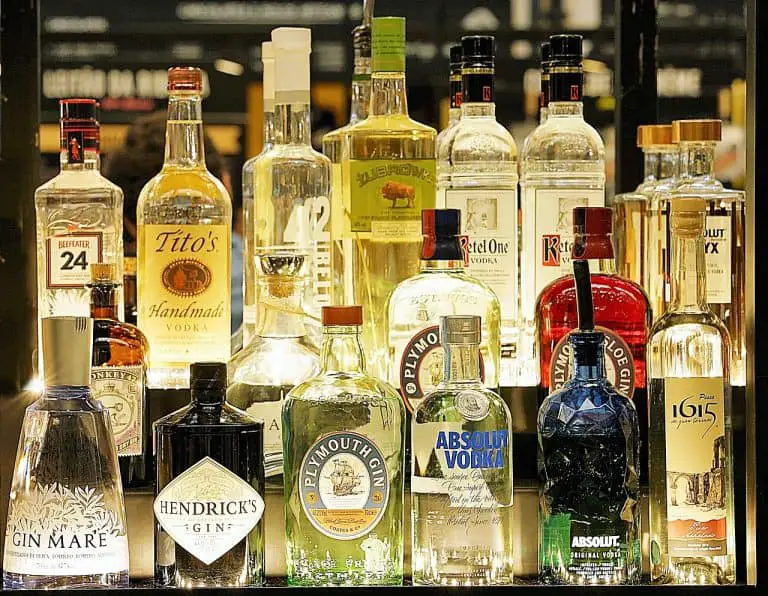Is Gin Gluten Free? Exploring Brands and Testing for Gluten
In the past, determining if gin is gluten-free was simple, but with the popularity of flavored varieties, it can be more complex.
While gin is generally safe for those with gluten sensitivity, it’s important to be cautious about specific ingredients.
Before enjoying a G&T, it’s wise to understand the nuances to ensure your drink is truly gluten-free.
Continue Reading to Understand These Key Points:
- Most gin is gluten-free due to the distillation process removing gluten proteins.
- Opt for gins distilled from gluten-free grains for added safety.
- Popular gluten-free gin brands include Bombay Sapphire, Tanqueray, and Hendrick’s.
- Check for gluten-free labels and certifications to ensure compliance with safety standards.
Understanding Gin Ingredients
In gin production, grains like barley, wheat, rye, or corn are distilled to create the base spirit. Juniper berries and various botanicals are then added to shape the unique flavor profile of the gin.
The choice of ingredients is crucial in determining the quality and taste of the final product. Distillers carefully select botanicals such as coriander, lemon, or licorice to create a balanced blend of flavors that sets each gin apart.
Understanding the production process helps consumers appreciate the craftsmanship behind different gin brands.
For those on a gluten-free diet, knowing the ingredients in gin is important. Although gin is typically made from grains containing gluten, the distillation process removes gluten proteins, making most gins safe for those with gluten sensitivities.
It’s worth noting that flavored or barrel-aged gins may contain gluten if additional ingredients are added after distillation. By understanding the ingredients and production process of gin, individuals can make informed decisions about its gluten content and suitability for a gluten-free diet.
Gluten Content in Gin
When considering the gluten content in gin, it’s essential to understand the impact of the distillation process on the final product’s suitability for individuals with gluten sensitivities.
Gin is typically distilled from grains like barley, wheat, or rye; however, most gin is considered gluten-free due to the distillation process.
The Coeliac Disease Foundation confirms that distilled alcohol, including pure gin, doesn’t contain gluten peptides, making it safe for those with gluten sensitivities, such as individuals with Coeliac Disease.
During distillation, harmful proteins from gluten-containing grains are removed, ensuring that the resulting gin meets gluten-free standards.
While gin made from traditional gluten grains can be safe for consumption, opting for gins distilled from gluten-free grains like corn or potatoes can further minimize any potential risks for individuals following a gluten-free diet.
It’s important to note that flavored or mixed varieties of gin may still contain gluten, so it’s advisable to check labels or choose confirmed gluten-free gin brands to ensure a safe option for those with gluten sensitivities.
Popular Gluten-Free Gin Brands
When it comes to gluten-free gin brands, there are several top contenders worth exploring.
Bombay Sapphire, known for its sustainable practices, offers a gluten-free option for gin enthusiasts.
Tanqueray, with its quadruple distillation process, is another excellent choice for those seeking a gluten-free gin experience.
Hendrick’s, Cold River, and Gordon’s are also popular gluten-free gin brands known for their quality and adherence to gluten-free standards.
Top Gluten-Free Gins
Among the top gluten-free gins available, Bombay Sapphire Gin is notable for its gluten-free status and sustainability commitment. Tanqueray London Dry Gin, quadruple distilled, is another excellent gluten-free option.
Hendricks Original Gin, with a unique taste, is both gluten-free and vegan. Cold River Traditional Gin, made from gluten-free potatoes, offers a distinctive choice.
Gordons London Dry Gin, crafted from 100% Grain Neutral Spirit, ensures a gluten-free drinking experience. These gins highlight the quality and variety in the gluten-free gin market.
Best Brands
Continuing our look at gluten-free gin options, let’s highlight the best brands in the market. These top choices cater to various preferences:
- Bombay Sapphire Gin: Known for sustainability practices, this gluten-free gin is a popular favorite.
- Tanqueray London Dry Gin: A quadruple distilled gluten-free option for classic gin enthusiasts.
- Hendricks Original Gin: Gluten-free and vegan, appealing to diverse consumers for a unique experience.
These brands offer quality ingredients and flavors, making them top contenders in the gluten-free gin market.
Cross-Contamination Risks
In gin production, cross-contamination risks stem from shared equipment processing gluten-containing grains like wheat, barley, or rye. Facilities handling these grains may heighten the chance of gluten cross-contact during gin manufacturing.
The presence of residual gluten particles from previous batches underscores the need for strict cleaning protocols in distilleries working with gluten grains.
Individuals, especially those with celiac disease, must be vigilant about cross-contact when choosing gin to reduce the risk of gluten exposure. Despite the distillation process potentially removing gluten proteins, the concern of cross-contamination remains significant for gluten-sensitive individuals.
Distilleries should implement rigorous cleaning procedures and maintain clear separation between gluten-containing grains and gluten-free ingredients to ensure gin’s status as a gluten-free product.
Gin Varieties and Gluten-Free Status
Coming from the discussion of cross-contamination risks in gin production, it’s essential to highlight the gluten-free status of various gin varieties to help individuals with gluten sensitivities make informed choices.
When it comes to gin varieties and their gluten-free status, here are some key points to consider:
- Bombay Sapphire Gin: This gin is gluten-free and is also recognized for its sustainable production process, making it a popular choice for those with gluten sensitivities.
- Tanqueray London Dry Gin: With its quadruple distillation process, Tanqueray has been confirmed to be gluten-free, providing a safe option for individuals avoiding gluten cross-contact.
- Hendricks Original Gin: Not only is this gin gluten-free, but it’s also vegan-friendly, offering a versatile choice for those with specific dietary preferences.
These gin varieties, along with Cold River Traditional Gin and Gordons London Dry Gin, showcase that individuals with gluten sensitivities have a range of gluten-free options available in the market.
Labelling Regulations for Gluten-Free Gin
The FDA mandates that gin products labeled gluten-free must contain less than 20 parts per million of gluten, ensuring safe consumption for those with gluten sensitivities.
Manufacturers can choose to label their gin products as gluten-free if they meet this standard, providing transparency to consumers.
Look for the gluten-free label when choosing gin to comply with FDA requirements and consider gluten-free certification for informed choices.
Understanding these regulations empowers consumers to select gin in accordance with their dietary needs.
Gin and Celiac Disease
As someone with celiac disease, understanding the relationship between gin and gluten is crucial.
While pure distilled gin is generally safe due to the distillation process removing gluten proteins, residual traces can still cause reactions for some individuals.
Opting for confirmed gluten-free gin brands and carefully checking labels for added gluten ingredients in flavored gins can help minimize risks for those with celiac disease.
Gin and Gluten
When considering gin in relation to celiac disease, it’s essential to understand the gluten content in different types of gin.
Key Points:
- Most gins are gluten-free due to the distillation process that removes harmful proteins.
- The FDA requires distilled spirits like gin to have gluten levels below 20 parts per million.
- Flavored gins may contain gluten ingredients, posing a risk to individuals with celiac disease.
For those with celiac disease, choosing gins made from gluten-free grains like corn or potatoes is recommended to minimize risks. Always check labels and contact manufacturers for clarity on the gluten content in gin.
Celiac Concerns
Considering the potential risks of gluten exposure for individuals with celiac disease, it’s crucial to be mindful of the ingredients and production processes involved in the gin they consume.
Distilled gin is generally regarded as gluten-free and safe for those with gluten intolerance. The distillation method effectively removes gluten proteins from grains like wheat, barley, and rye commonly used in gin production.
However, despite this process, there’s still a possibility of gluten cross-contact, leading to adverse reactions in some individuals with celiac disease. To mitigate such risks, individuals should carefully check labels for any added ingredients or choose gin brands that are certified gluten-free, such as those labeled as Gin Safe.
Regular monitoring for gluten-related symptoms post-consumption is also advisable for those with celiac concerns.
Safe Gin Options
To ensure safe consumption for individuals with celiac disease, it’s crucial to consider gin options that meet gluten-free requirements. When selecting safe gin choices, remember the following:
- Distillation Process: Traditional gin made from gluten-containing grains like barley, wheat, or rye is generally safe due to the distillation process removing gluten proteins effectively.
- Label Checking: While pure distilled gin is typically safe, flavored or mixed varieties may contain gluten. Check labels for gluten content to avoid any risks of gluten cross-contact.
- Alternative Options: For those sensitive to grain-based gins, potato-based gins can offer a safe substitute. Always seek advice from a healthcare professional regarding suitable gin choices for your condition.
Final Thoughts on Gin and Gluten
When assessing the gluten content of gin, the distillation process is key in determining its gluten-free status. Distilled gin, produced through distillation, is generally gluten-free as it eliminates harmful proteins from gluten grains.
Individuals with celiac disease should be cautious and check labels for any added flavorings or ingredients in certain gin products that may contain gluten. Choosing gin made from gluten-free grains like corn or potatoes can further reduce the risk of gluten exposure for those with sensitivities.
Alternatives like G-Vine Gin, made from vine blossoms and grape brandy, offer gluten-free options for those with gluten reactions. For individuals with celiac disease or gluten sensitivity, it’s important to be mindful of potential gluten traces in gin and opt for certified gluten-free choices to minimize any negative health effects.
Final Thoughts
Gin shines as a gluten-free option, distilled to perfection. With careful label scrutiny, gin lovers can enjoy a worry-free glass of their favorite botanical elixir.
Cheers to the gluten-free goodness of gin – a true liberation for those with dietary restrictions. Flavor knows no bounds!






